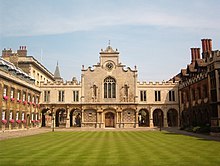Maurice Cowling
[2] In 1943 Cowling won a scholarship to Jesus College, Cambridge, but was called up for military service in September 1944, where he joined the Queen's Royal Regiment.
[8] In 1961 Cowling was elected a fellow of Jesus College and Director of Studies in Economics, shortly before the History Faculty appointed him to an Assistant Lectureship.
Cowling argued that social science's claim to have discovered how people behaved was false because politics was too complex and fluid to be rationalised by theorists and only fully intelligible to politicians.
Dr. Roland Hall reviewed the book in Philosophical Quarterly (January 1965) and called it "dangerous and unpleasant",[11] with Cowling later remarking that this "was what it was intended to be".
[14] He was appointed the literary editor of The Spectator from 1970 to 1971, and in the early 1970s he wrote articles of a broadly Powellite nature arguing against the UK being a member of the EEC.
[15] In 1977 Margaret Thatcher visited the Cambridge Graduate Conservative Association of Peterhouse where she "cut through the compact subtlety and 'rational pessimism' of [Cowling]" and sharply retorted: "We don't want pessimists in our party".
The British journalist Neal Ascherson summarised the quarrel between Cowling and Trevor-Roper as:Lord Dacre, far from being a romantic Tory ultra, turned out to be an anti-clerical Whig with a preference for free speech over superstition.
He did not find it normal that fellows should wear mourning on the anniversary of General Franco’s death, attend parties in SS uniform or insult black and Jewish guests at high table.
For the next seven years, Trevor-Roper battled to suppress the insurgency of the Cowling clique ("a strong mind trapped in its own glutinous frustrations"), and to bring the college back to a condition in which students might actually want to go there.
[19] In November 1989 Cowling published his essay on "The Sources of the New Right" in Encounter which detailed the ideological roots of Thatcherism in Britain and became the Preface to the second edition of Mill and Liberalism in 1990.
[8] In Cowling's view "Liberalism is essentially the belief that there can be a reconciliation of all difficulties and differences, and since there can't, it is a misleading way to approach politics".
[23] He wrote that "In the future there will be an introduction bearing the sequence-title which will deal in its widest aspects with the period from 1850 to 1940 and will assess the methods used in the volumes which have now been published".
Cowling believed the decisions and actions of “the politicians who mattered” (who, by his count, numbered a mere fifty or sixty) could not “be understood as derivative offshoots of pre-existing social conditions.” The historian’s job was therefore to “impute motive, intention and disingenuousness to the [political] actors whose personalities we have created out of the letters and speeches which survive.” [27] In 1975 appeared The Impact of Hitler, dealing with 1933 to 1940.
Made up of hundreds of essays on the thought of individuals, the work neither engaged with other scholarship nor developed an interpretative model for understanding modern Britain".
[9] Cowling placed Christianity squarely at the centre of English culture post-1840 and claimed that anti-Christians more often than not held traditional religious assumptions and prejudices.
Secularisation was not so fast or complete as had been previously argued, but "defenders of orthodoxy as well as their assailants were subjected to pithy, provocative irony" by Cowling.
